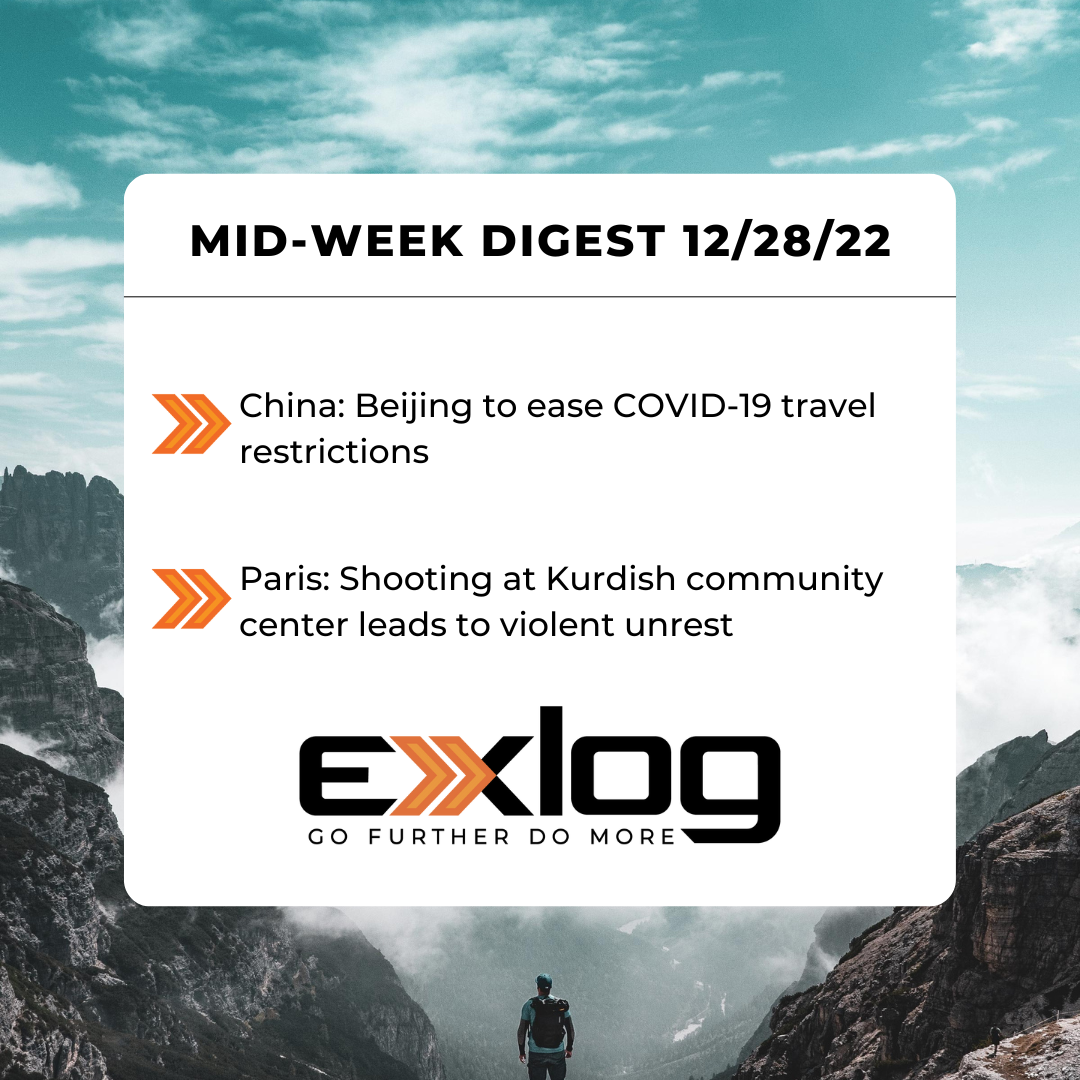COVID-19 travel restrictions ease in Beijing and shooting at Kurdish community center leads to violent unrest in Paris
China: Beijing to ease COVID-19 travel restrictions
The Chinese National Health Commission (NHC) has announced that it will ease COVID-19 travel restrictions on Jan. 8, likely leading to a surge in inbound and outbound travel and a further increase in domestic infections. The government has vowed to implement various measures to alleviate pressure on international travel and trade – the two sectors most severely impacted by China’s zero-COVID policy, which has managed to limit domestic transmission of the virus since January 2020. In addition to resuming the issuance of ordinary visa, stay, and residence documents for foreigners, the government will prioritize arrangements at visa processing facilities for foreign nationals traveling for work, business, study, family visits, and reunions. Limits on the number of international passenger flights will also be removed, though a schedule has yet to be published. COVID-19 screenings and isolation upon entry for international arrivals will no longer be obligatory, but passengers will still be required to wear masks on China-bound flights. Travelers will still have to present a negative result from a PCR test obtained 48 hours prior to departure and declare their health status on customs cards prior to arrival. Travelers who feel ill or show symptoms will receive an antigen test at customs; those who test positive will be permitted to quarantine at home instead of in field hospitals. The NHC’s “Leave Home Safe” contact-tracing app is no longer necessary for entry into the country but remains a requirement for high-risk areas such as schools, nurseries, and elderly care facilities. In response to China’s changing policies, some countries – including Japan and Malaysia – have implemented testing, quarantine, and surveillance measures for travelers arriving from mainland China; the US is reportedly considering similar steps. China’s change in approach to pandemic control policies comes in the wake of anti-lockdown protests that swept at least 16 cities during the last week of November. The relaxation of domestic COVID restrictions prompted by the November protests has already led to a renewed outbreak, and health experts are advising to postpone nonessential travel to China until the current COVID-19 surge subsides.
Paris: Shooting at Kurdish community center leads to violent unrest
A shooting in Paris’s Porte-Saint-Denis area on Dec. 23 triggered violent protests in the center of the city, resulting in casualties, localized travel disruptions, and private property damage. The shooter targeted a Kurdish community center, a nearby café, and a barber’s shop, killing three people and injuring three others. Security forces arrested the perpetrator shortly after the incident; the man has since been released from custody due to health concerns and transferred to a psychiatric facility. Although the incident has not been classified as a terrorist act, the shooter has a history of attacking members of immigrant communities, indicating that the shooting was almost certainly fueled by racism and xenophobia. Members of the Kurdish community and anti-racism activists gathered for a demonstration in the vicinity of various landmarks in Paris’s 10th district – including Place de la République and Place de la Bastille – shortly after the shooting, erecting roadblocks and causing localized travel disruptions on Dec. 23-24. While the gathering was initially peaceful, it escalated to violence as protesters vandalized local businesses, set fire to various objects, and overturned several vehicles, prompting security forces to respond with tear gas and stun grenades. At least 31 police officers sustained injuries, and 11 protesters were arrested following two days of anti-racism rallies. Operations at several metro stations were also temporarily disrupted, although train traffic normalized on Dec. 24 as France’s Kurdish Democratic Council issued a statement calling for an end to the protests. While no further rallies have materialized in Paris since Dec. 24, members of the Kurdish community also marched in the city of Lorient on Dec. 26; the demonstration did not result in significant disruptions. Further episodes of unrest cannot be ruled out in the near term, as the investigation into the shooting is ongoing.


